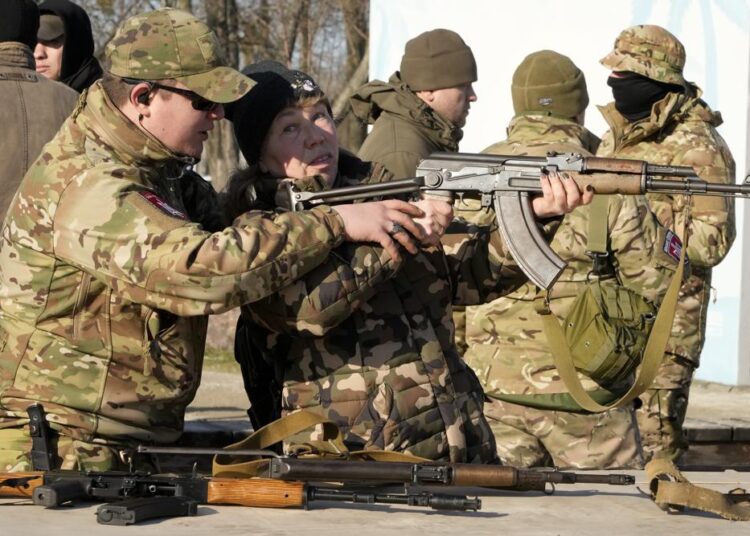MOSCOW — Some airlines have canceled or diverted flights to Ukraine amid heightened fears that an invasion by Russia is imminent despite intensive weekend talks between the Kremlin and the West, AP reported.
In an hourlong Saturday call with Russian President Vladimir Putin, President Joe Biden said that invading Ukraine would cause “widespread human suffering” and that the West was committed to diplomacy to end the crisis but “equally prepared for other scenarios,” the White House said. It offered no suggestion that the call diminished the threat of an imminent war in Europe.
The two presidents spoke a day after Biden’s national security adviser, Jake Sullivan, warned that US intelligence shows a Russian invasion could begin within days.
Russia denies it intends to invade but has massed well over 100,000 troops near the Ukrainian border and has sent troops to exercises in neighboring Belarus. US officials say Russia’s buildup of firepower has reached the point where it could invade on short notice.
Dutch airline KLM has canceled flights to Ukraine until further notice, the company said Saturday.
Dutch sensitivity to potential danger in Ukrainian airspace is high in the wake of the 2014 shooting down of a Malaysian airliner over an area of eastern Ukraine held by Russia-backed rebels. All 298 people aboard died, including 198 Dutch citizens.
The Ukrainian charter airline SkyUp said Sunday that its flight from Madeira, Portugal, to Kyiv was diverted to the Moldovan capital Chisinau after the plane’s Irish lessor said it was banning flights in Ukrainian airspace.
Ukrainian presidential spokesman Serhii Nykyforov told The Associated Press that Ukraine has not closed its airspace. A statement from the Infrastructure Ministry said: “Some carriers are experiencing difficulties associated with fluctuations in the insurance markets.”
The Putin-Biden call, after a call between Putin and French President Emmanuel Macron earlier in the day, came at a critical moment for what has become the biggest security crisis between Russia and the West since the Cold War. U.S. officials believe they have mere days to prevent an invasion and enormous bloodshed in Ukraine.
While the US and its NATO allies have no plans to send troops to Ukraine to fight Russia, an invasion and resulting punishing sanctions could reverberate far beyond the former Soviet republic, affecting energy supplies, global markets and the power balance in Europe.
In a sign that American officials are getting ready for a worst-case scenario, the United States announced plans to evacuate most of its staff from the embassy in the Ukrainian capital and urged all American citizens in Ukraine to leave the country immediately. Britain joined other European nations in telling its citizens to leave Ukraine.
Canada has shuttered its embassy in Kyiv and relocated its diplomatic staff to a temporary office in Lviv, located in the western part of the country, Foreign Affairs Minister Melanie Joly said Saturday. Lviv is home to a Ukrainian military base that has served as the main hub for Canada’s 200-soldier training mission in the former Soviet country.
Ukrainian President Volodymyr Zelenskyy has downplayed concerns about an invasion, urging the country to remain calm.
“I believe that today in the information space there is a lot of information,” he said Saturday.
The timing of any possible Russian military action remains a key question.
The US picked up intelligence that Russia is looking at Wednesday as a target date, according to a US official familiar with the findings. The official, who was not authorized to speak publicly and did so only on condition of anonymity, would not say how definitive the intelligence was.
Russia is demanding that the West keep former Soviet countries out of NATO. It also wants NATO to refrain from deploying weapons near its border and to roll back alliance forces from Eastern Europe — demands flatly rejected by the West.
Russia and Ukraine have been locked in a bitter conflict since 2014, when Ukraine’s Kremlin-friendly leader was driven from office by a popular uprising. Moscow responded by annexing the Crimean Peninsula and then backing a separatist insurgency in eastern Ukraine, where fighting has killed over 14,000 people.






Discussion about this post